Basilicata - region of Italy
Basilicata (dead link: January 2023), also known as Lucania, is a region of Southern Italy.
Provinces
Basilicata is divided into two provinces: Matera (MT)
The world-famous "sassi" of Matera, the suggestive landscapes of Murge plateau and "calanchi" (badlands), the Ionian coast rich of Greek archaeological remains and beach resorts.
Potenza (PZ)
The green heart of the region with two National Parks, the pictoresque town of Maratea on the Tyrrhenian Sea, medieval villages and castles, excellent wines and products.
Cities
- Potenza 📍 — The regional capital and the largest city, home of Basilicata National Archaeological Museum
- Irsina 📍 — One of the oldest towns, rich of religious architecture
- Maratea 📍 — The "pearl of the Tyrrhenian Sea" also known as "the town with 44 churches"
- Matera 📍 — The town of "Sassi" (UNESCO World Heritage), declared European Capital of Culture for 2019
- Melfi 📍 — Norman age center of the Vulture Area with the Castle of Emperor Frederick II
- Policoro 📍 — Beach resort on the Ionian Sea, with a National Archaeological Museum
- Venosa 📍 — One of "Italy's most beautiful villages", birthplace of Horace with an important archaeological site
Other destinations
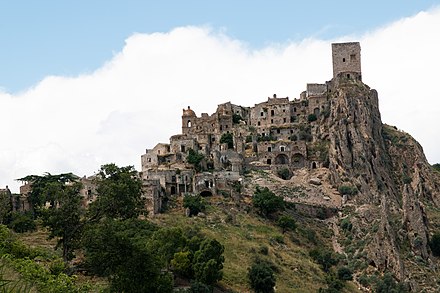
- Barile 📍 — Small village that preserves its Greek-Albanian origins
- Craco 📍 — Fascinating ghost town, set of numerous films such as The Passion of The Christ
- Lagopesole 📍 — Small medieval village located on a hill and dominated by the silhouette of a Norman castle
- Metaponto 📍 — Resort on the Ionian Sea with the amazing remains of the Temple of Hera
- Rapolla 📍 — Renowned center of winery production and spa
- Senise 📍 — Beautiful and well preserved medieval town with an incredible variety of typical local dishes
Understand
As a visitor, you'll find that Basilicata has much to offer. There's an abundance of religious, historical, and cultural attractions, fantastic seaside tourism opportunities, and great cultural opportunities. As is the case throughout Southern Italy, the pace of life is slow and relaxed. Still, with so many exciting things to do, Basilicata is a wonderful destination for a quiet getaway or a weekend adventure.
Etymology
The exact origin of the word "Basilicata" is unclear. It is possible that it comes from a Greek word, "basilikos" (Greek: βασιλικός).
At some point in its history, Basilicata was known as Lucania .
History
Modern history
Throughout much of the 1940s, Basilicata was an impoverished, poorly developed region. The region suffered from great poverty, there was a dearth of food, illiteracy was common, and suffered from high child mortality rates. Many residents had no access to water or electricity and there was widespread discontent. Alcide De Gasperi, Italy's prime minister at the time, once slammed the slums of Matera as a "national disgrace".
It wasn't until the 1950s that things began to change for the better. With money pouring in from the Marshall Plan, Alcide De Gasperi then embarked on an aggressive, controversial campaign to rapidly develop the region. In the years to follow, Matera became the region's most well-known city and in 2019 it became the European Capital of Culture.
Even though the region has great tourism potential, it is one of the least visited, least developed, and least populated areas in Italy; the region has some of the highest poverty and migration rates in Italy, and the fact that the local government doesn't do much to promote the region means that most tourists who visit Italy don't know about what all this beautiful region has to offer. This aside, the Lucanians are quite friendly and helpful and are happy with what they have.
Get in
By plane
Bari-Palese International Airport (IATA: BRI) is 64 km distant from Matera and is linked to the town by the regional bus company COTRAB. This airport is the best choice to reach the eastern-Ionian area of Basilicata, while Naples International Airport (IATA: NAP) is the best option to exploring the western-Tyrrhenian area of the region. The Autolinee Liscio bus company provides linking from the Naples International Airport to the regional capital Potenza (170 km) in about two hours.
By train
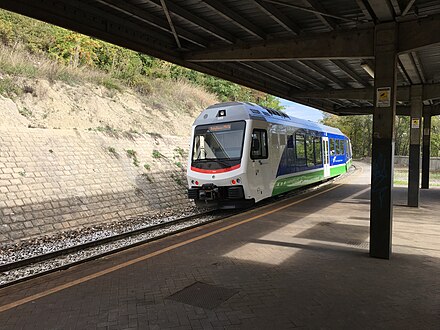
By car
Three autostrade (toll roads) can be used to reach Basilicata from other parts of Italy:
- A2 — Motorway of the Mediterranean Sea, links Salerno to Reggio Calabria passing through the area of the Pollino National Park (southern part of the region). It has a ramification that directly connects Potenza to Salerno
- A14 — Adriatic Motorway, links Bologna to Taranto passing near Matera and Metaponto
- A16 — Motorway of the Two Seas, links Naples to Canosa passing near Melfi and the Vulture area
For more information you can check the website of Autostrade per l'Italia.
Get around
Strade statali (trunk roads) can be used for reaching internal destinations or the surrounding regions:
— Jonica, links Reggio di Calabria to Taranto through Basilicata Ionic coast
— Basentana, links Potenza to Metaponto
— Fondo di Valle d'Agri, links Atena Lucana to Scanzano Jonico through Val d'Agri area
— Bradanica, links Foggia to Matera
— links Potenza to Melfi
See
Archaeological sites
- Grumento Nova — Archeological park of the Roman city of Grumentum.
- Metaponto — Well preserved remains of the ancient Greek city of Metapontion.
- Rupestrian Churches of Matera — A high number of troglodyte churches excavated in the rock during the early Middle Ages (UNESCO World Heritage).
- Policoro — Remains of the Greek city of Herakleia.
- Venosa — Paleolithic park of Notarchirico, remains of the Roman city of Venusia and Jewish catacombs.
Castles
- Castle of Lagopesole in Avigliano.
- Castle of Cancellara (dead link: January 2023)
- Castle of Lavello
- Castello Tramontano in Matera.
- Castello del Malconsiglio in Miglionico.
- Castle of Muro Lucano
- Castle of Valsinni (dead link: February 2023)
- Aragonese Castle (dead link: February 2023) in Venosa.
Museums

- Exhibition venue of Palazzo De Lieto in Maratea
- Exhibition venue of Palazzo Ducale in Tricarico
- Museum-Workshop of the Peasant Culture in Matera.
- National Archaeological Museum of Alta Val d'Agri (dead link: January 2023)
- National Archaeological Museum of Basilicata "Dinu Adamesteanu" in Potenza.
- National Archaeological Museum "Domenico Ridola" in Matera (dead link: January 2023)
- National Archaeological Museum of Melfese "Massimo Pallottino"
- National Archaeological Museum of Metaponto
- National Archaeological Museum of Muro Lucano
- National Archaeological Museum of Siritide (dead link: January 2023) in Policoro.
- National Archaeological Museum of Venosa (dead link: January 2023)
- National Museum of medieval and modern art in Matera
Nature reserves
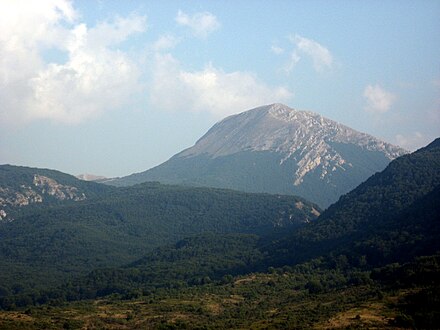
.jpg/440px-Lago_del_Pantano_(Pignola,_PZ).jpg) Approximately the 30% of Basilicata's total area is occupied by nature reserves. Here are the most relevant ones:
Approximately the 30% of Basilicata's total area is occupied by nature reserves. Here are the most relevant ones:
- Abetina di Laurenzana Regional reserve — Oasis rich of fauna such as the Italian wolf.
- | Appennino Lucano-Val d'Agri-Lagonegrese National Park — a 70,000 hectare protected area in the heart of Apennines.
- Murgia Materana Regional Park (dead link: January 2023) — Characterized by the presence of rupestrian churches surrounded by the impervious territory of the Murge plateau (UNESCO World Heritage).
- Pantano di Pignola Lake (dead link: January 2023) — A WWF oasis near Potenza.
- Pollino National Park (dead link: February 2023) — With peaks that reach the heights of 2.260 meters, it is the largest national park of Italy and an UNESCO World Heritage site.
- Regional park of Gallipoli Cognato e Piccole Dolomiti Lucane (dead link: January 2023)
- San Giuliano Lake Regional reserve — A WWF oasis ideal for birdwatching.
- Volcanic Lakes of Monticchio Regional reserve (dead link: January 2023) — Two small likes situated under the Mount Vulture and surrounded by a dense forest.
Check for a detailed map of Basilicata's natural protected areas:
Villages
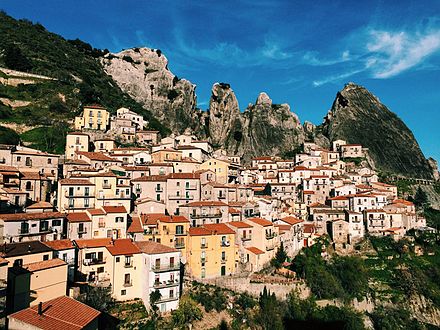
- Acerenza — Town of ancient Greek origins with a remarkable cathedral. One of Italy's most beautiful villages.
- Aliano — Surrounded by the striking landscape of "calanchi" (badlands), it is famous for having being the home of Carlo Levi during his exile in the fascist period.
- Castelmezzano and Pietrapertosa — Two of Italy's most beautiful villages, both located in the heart of Basilicata's Apennines.
- Guardia Perticara — Fascinating medieval town in the Val d'Agri territory, one of Italy's most beautiful villages.
- Rotondella — Known as the "Balcony of the Ionian Sea", it is perched on a hill with an amazing view over the Gulf of Taranto.
- Tricarico — One of the best preserved medieval historic centers of the region.
- Viggianello — Enchanting town surmounted by the massif of Pollino. One of Italy's most beautiful villages.
Do
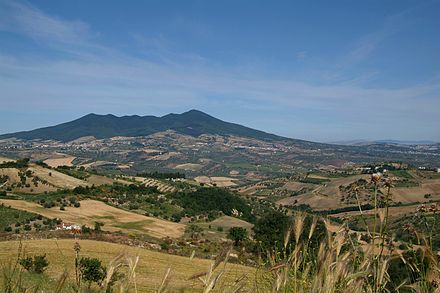
- Take part in the Marriage of The Trees Festival (dead link: January 2023) in different parts of the region.
- Visit the Vulture region, the area of production of the world-famous DOC wine Aglianico del Vulture.
- Relax or take a bath in one of the resorts along the Ionic coast (dead link: January 2023).
- If you are not afraid of heights try the incredible experience of "Volo dell'Angelo" (the Angel Flight): a flight between the towns of Castelmezzano and Pietrapertosa on a suspended steel cable. You will reach the speed of 120 km/h at 1020 meters of height!
- Walk one of the longest footbridges, Ponte tibetano di Castelsaraceno.
Eat
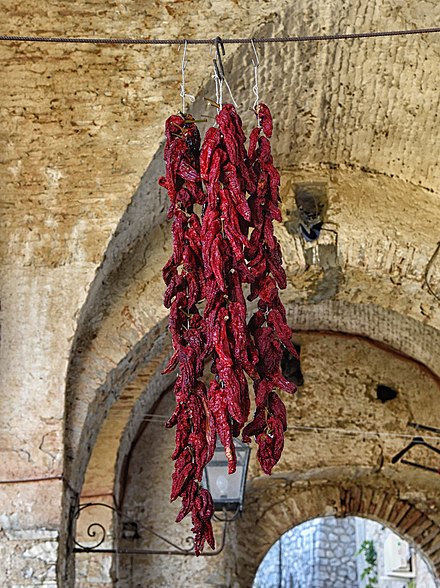 The cuisine of Basilicata is deeply anchored in peasant traditions. Its typical traits are a large use of stale bread crumbs as a condiment and chili and horseradish as spices. Basilicata is widely known for the peperoni cruschi (crunchy peppers), nicknamed "The red gold of Basilicata", a dry and sweet-flavoured variety that can be found in most regional dishes or even consumed as a chip. It is the dried form of the Peperone di Senise, one of the most popular Italian varieties. Basilicata is also renowned for Pane di Matera (Matera Bread), Lucanica sausage, cheeses like Pecorino di Filiano and Canestrato di Moliterno and Fragola Cadonga, a variety of strawberry cultivated in the Metaponto plain.
The cuisine of Basilicata is deeply anchored in peasant traditions. Its typical traits are a large use of stale bread crumbs as a condiment and chili and horseradish as spices. Basilicata is widely known for the peperoni cruschi (crunchy peppers), nicknamed "The red gold of Basilicata", a dry and sweet-flavoured variety that can be found in most regional dishes or even consumed as a chip. It is the dried form of the Peperone di Senise, one of the most popular Italian varieties. Basilicata is also renowned for Pane di Matera (Matera Bread), Lucanica sausage, cheeses like Pecorino di Filiano and Canestrato di Moliterno and Fragola Cadonga, a variety of strawberry cultivated in the Metaponto plain.
Some of the most characteristic dishes include:
- Pasta con i peperoni cruschi — pasta dish with peperoni cruschi and fried bread crumb
- Tumact me tulez — pasta dish with tomato, anchovy, bread crumb and walnuts
- Fusilli con pezzente e rafano — pasta dish seasoned with a ragù sauce made from pezzente salami and horseradish
- Gnummareddi — Sheep or goat's offal rolled in bowels
- Grattonato — Sheep's offal with eggs, pecorino cheese and peperoni cruschi powder
- Baccalà a ciauredda — a fish dish made from stockfish, tomato, onion, olives and raisins
- Rafanata — baked frittata with horseradish and Pecorino cheese
- Pastizz — baked turnover with pork meat, eggs and cheese
- Calzoncelli — fried or baked pastries filled with a cream of almonds and chocolate
- Scorzette — baked pastries made from egg white, hazelnuts and melted chocolate
Drink
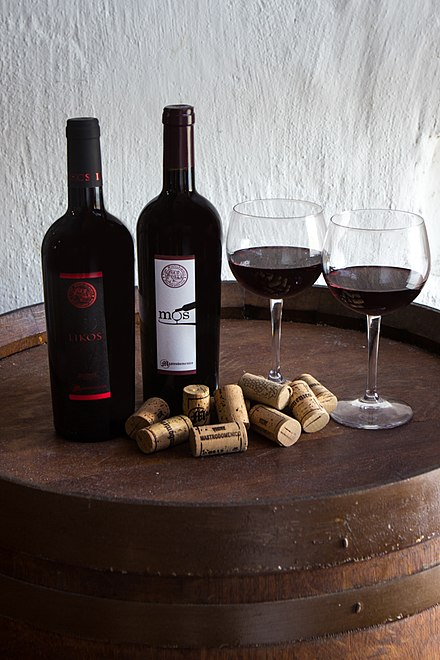
- Aglianico del Vulture — a world-famous DOCG red wine produced in the Vulture area
- Amaro Lucano — a herbal liqueur usually used as an apéritif or digestif
- Sempre Freddo (dead link: January 2023) — a liqueur made from a mixture of the Aglianico wine, black cherry and vanilla
- Birra Morena — a multi-awarded beer
Stay safe
The region is one of the safest in the country. Pickpocketing and violent crimes are extremely rare.
Go next
- Apulia — It borders Basilicata to the east. You can explore the Alta Murgia National Park or the nearby cities of Foggia, Bari and Taranto.
- Calabria — It borders Basilicata to the south. Visit the stunning beaches of Praia a Mare on the Tyrrhenian coast, or the Archaeological remains of the Greek colony of Sibari on the Ionic coast.
- Campania — It borders Basilicata to the west. The Cilento and Vallo di Diano National Park (UNESCO World Heritage) is quite close to Potenza and Maratea, while the green Irpinia district lies to the north just beyond the two lakes of Mount Vulture (an extinct volcano).

